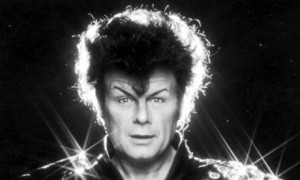 Mention the name Gary Glitter to most over-30s in the UK and you’ll usually get a look of contempt. Once one of the darlings of the 70s glam-rock music scene, he is now synonymous with his various convictions for child porn and transformation from a slightly manic-looking pop star to a bald-headed weirdo with a grey goatee.
Mention the name Gary Glitter to most over-30s in the UK and you’ll usually get a look of contempt. Once one of the darlings of the 70s glam-rock music scene, he is now synonymous with his various convictions for child porn and transformation from a slightly manic-looking pop star to a bald-headed weirdo with a grey goatee.
In fact, you’ll rarely – if ever – hear one of his songs played on the radio. Radio 2 – the most likely outlet for his tunes – regularly overlook him in the likes of Pick of The Pops or their festive/bank holiday countdowns.
So there was naturally a bit of a kerfuffle when Gwyneth Paltrow decided to perform a cover version of Do You Wanna Touch Me on the TV show Glee – a song, in case you’re interested, that in January 1973 reached No.2 in the UK singles charts.
Glitter – real name Paul Gadd – committed a pretty heinous crime, but is that a reason to expunge his music from the annals of history? I don’t think so.
Take the following music artists, for example: Jerry Lee Lewis (married his 13-year-old cousin), James Brown (convicted of armed robbery and arrested numerous times for domestic abuse) and Phil Spector (convicted of murder).
If radio bosses carried out the same punishment on their music, as has been on Glitter’s, the likes of Great Balls of Fire, I Feel Good and Be My Baby would rarely be heard ever again.
And imagine what a dilemma radio bosses would have had if Michael Jackson had been found guilty of the child abuse crimes of which he was accused back in 2005. Can you imagine radio stations without the option of playing Beat It, Billie Jean, Wanna Be Startin’ Something or Smooth Criminal?
As I said before Glitter is obviously a disturbed individual, but his music should be separated from the man. Let’s not forget that his music was loved so much during the 1970s that he achieved 3 No.1s and another 8 Top 10 hits – no flash in the pan.
And in case you think he’s been completely expunged from popular music, take a closer listen to Katy Perry’s worldwide smash hit I Kissed A Girl. Do you recognise the drum beat that kicks it off and continues throughout the song. Yup, it’s a sample taken from none other than Gary Glitter’s Rock and Roll Part 2.
Let’s hope that someone finally decides to make the sensible decision and allow people to make up their own mind and hear Gary Glitter’s music for what it is – whatever the actions of the man.
 Today in the car, I suddenly realised, after 20 minutes of paying no attention, that I was listening to the aural wonder that is
Today in the car, I suddenly realised, after 20 minutes of paying no attention, that I was listening to the aural wonder that is